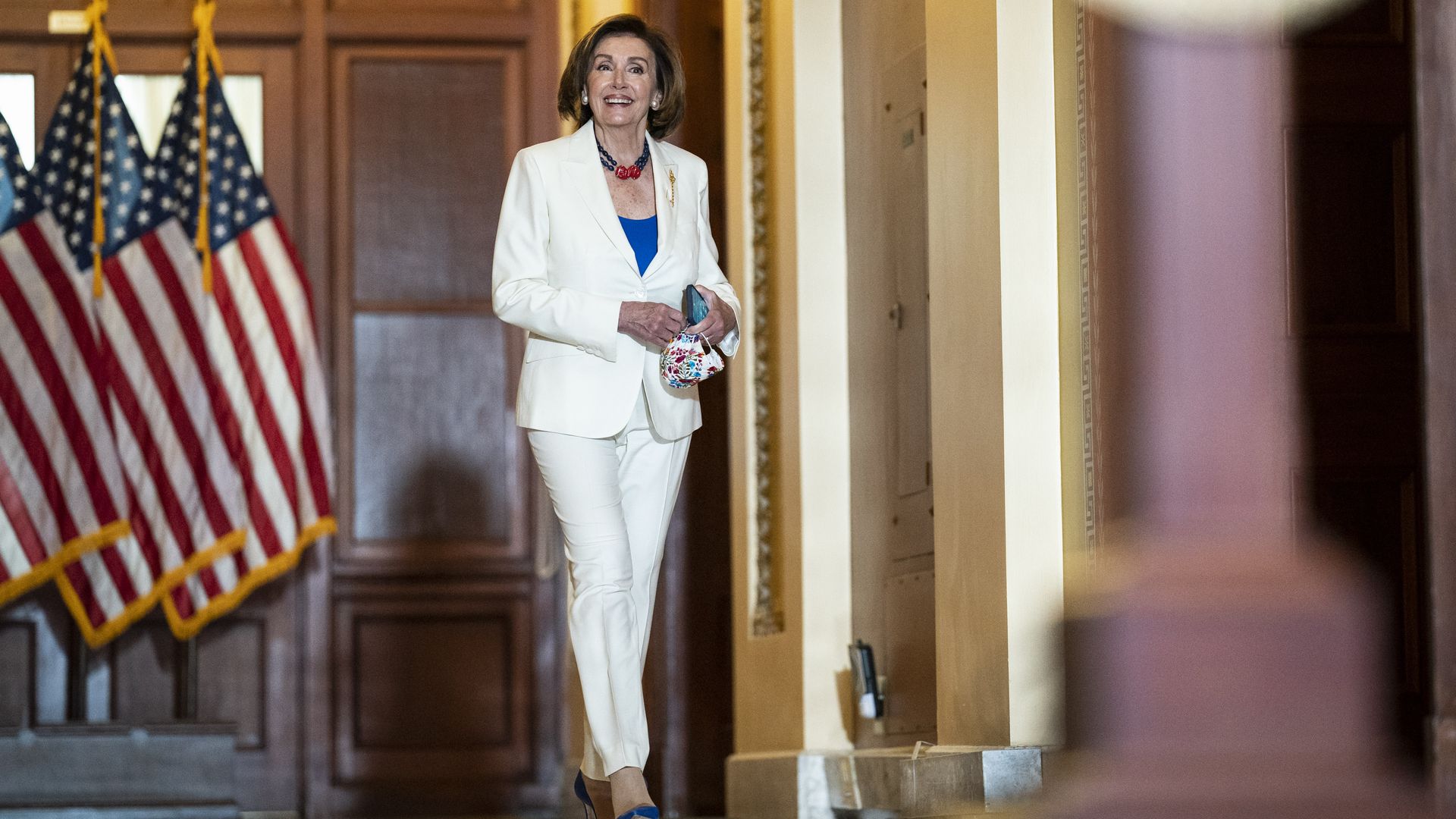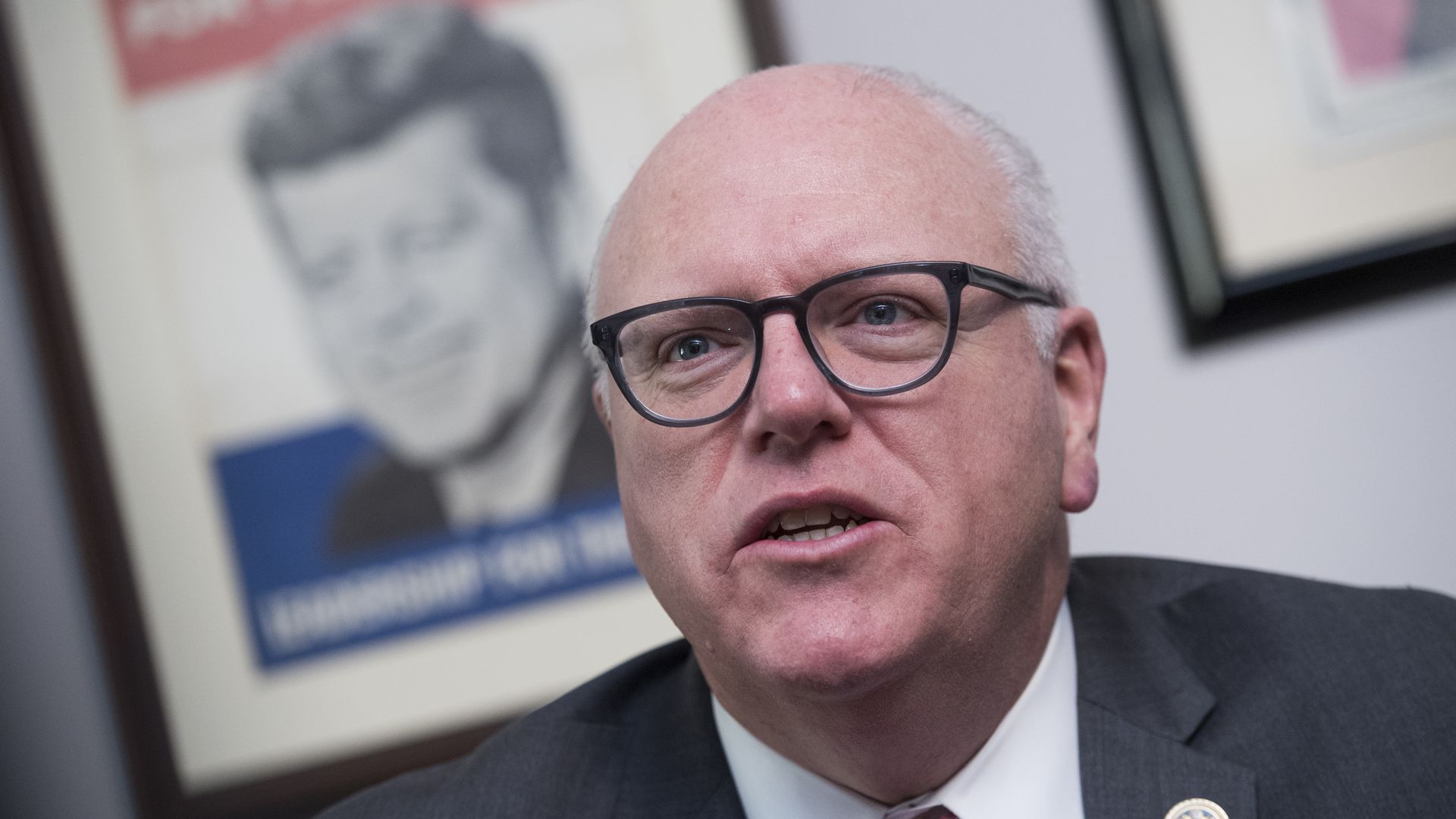| | | | | | | Presented By Facebook | | | | Axios Sneak Peek | | By Alayna Treene and Hans Nichols ·May 24, 2021 | | Welcome back to Sneak. ⚡ Situational awareness: President Biden will meet with George Floyd's family at the White House tomorrow, the first anniversary of his death. Today's newsletter — edited by Glen Johnson — is 1,428 words, a 5.5-minute read. | | | | | | 1 big thing: Scoop — Pelosi doesn't deliver matching donations |  | | | Photo: Jabin Botsford/The Washington Post/Bloomberg via Getty Images | | | | House Speaker Nancy Pelosi's campaign committee has repeatedly promised her donors she would personally match their financial contributions, but as of the last reporting period, she hadn't provided a dime of her own money, records reviewed by Axios' Lachlan Markay show. Why it matters: Deceptive political fundraising tactics are under scrutiny, and few are more popular than donation-matching pledges. Pelosi's campaign has gone a step further than most — promising that she herself would put up those matching funds. It hasn't reported any such contributions. What's happening: Nancy Pelosi for Congress sent at least 50 fundraising emails from January through March, pledging she would "personally" match contributions up to a certain multiple. - That's according to an Axios analysis of a political email archive maintained by researchers at Princeton University.
- "This is so critical, I'm personally 4x-matching all gifts for these final 24 hours," declared a typical email, sent in Pelosi's voice in January.
- Yet reports filed with the Federal Election Commission show Pelosi did not donate any personal funds to her campaign during the first quarter, nor has she ever done so.
Between the lines: Both parties use donation-matching offers to woo small-dollar contributors. Few actually say who is matching the donations, and some of the pledges could require matchers to exceed federal contribution limits themselves. - Federal law, though, allows candidates to provide unlimited sums to their own campaigns. Pelosi, whose net worth is estimated to be in the nine figures, could theoretically put up the matching funds offered in her campaign's solicitations.
- Her campaign raised just over $4 million in the first quarter of 2021. It's not clear how much its matching-offer solicitations generated, but more than half of the Q1 haul came from donations of under $200 — the sorts of small-dollar contributions grassroots those types of fundraising emails generally target.
- A spokesperson for Pelosi's campaign did not respond to multiple requests from Axios for comment about why she hadn't matched the donor contributions or whether she planned to do so.
According to a separate database of political emails maintained by the Defending Democracy Together Institute, Pelosi's personal matching offers continued through at least last week. - The latest one came Wednesday — the same day Axios first asked her campaign for comment.
Keep reading. |     | | | | | | 2. Scoop: New conservative PAC targets ... school board elections |  | | | Photo: Bill Clark/CQ-Roll Call Inc. via Getty Images | | | | A PAC that launched today will raise funds to support school board candidates who oppose public schools teaching critical race theory and the 1619 Project, which details the history of slavery, Axios' Stef Kight has learned. Why it matters: It's the first national political action committee to target local, historically nonpartisan school boards. And it's another sign of how they have entered the crucible of partisan politics. - School boards that used to debate sn0w-day calendars and other lesser matters are now facing scrutiny over their COVID-19 closure decisions, and any adoption of a curriculum employing critical race theory — an academic movement focused on systemic racism in U.S. laws.
The big picture: Such debates have already fueled a surge of new candidates across the country, as Axios reported. - At the same time, critical race theory has become a prime target and talking point for many Republicans. On Saturday, the GOP-controlled Texas Senate passed a bill that would limit the teaching of it in the state's public schools.
Between the lines: Political consultant and conservative writer Ryan Girdusky is behind the new PAC, called the "1776 Project." - He told Axios his goal "is to help raise awareness and campaign on behalf of school board candidates nationwide who reject the divisive philosophy of critical race theory and want to push it out of our public schools."
- "Help us overturn any teaching of the 1619 project or critical race theory," reads the call to action at the bottom of the PAC's new home page. "Let's bring back Patriotism and Pride in our American History."
- A pop-up provides a field to "report a school promoting critical race theory."
What to watch: Girdusky, a Trump supporter, said he plans to focus on a handful of school board elections in places such as North Carolina and Florida, and build momentum from there. - The PAC was officially formed in December, according to an FEC filing, but the group launches and began to solicit donations today.
Keep reading. |     | | | | | | 3. Scoop: Joe Crowley registers to lobby for musicians |  | | | Joe Crowley. Photo: Tom Williams/CQ-Roll Call Inc. | | | | Former Rep. Joe Crowley is registering to lobby for his first client — a coalition of recording artists to finally get paid when their work is played on the radio, Axios' Hans Nichols reports. Why it matters: Crowley is a New York Democrat who was on track to become House speaker until he lost a primary to Alexandria Ocasio-Cortez in 2018. Now, by registering to lobby, it's unlikely he'll join the Biden administration in any capacity. - When he was ousted from Congress two years ago, Crowley joined the international law firm Squire Patton Boggs. There had been political chatter about him joining the administration in some capacity.
- "I have always had a history of standing up for the little guy," Crowley told Axios about his plans to lobby for music performers.
- "FM and AM radio is playing their music but not paying for it," he added. "There are thousands of artists who are struggling to make ends meet — and COVID has only made the situation worse."
The big picture: Streaming services such as Spotify and Pandora pay performers a royalty every time a song is played on their platform. - Radio stations in the U.S. are only required to pay the songwriter and publisher of a song — not the artists performing it.
- For example, Willie Nelson receives royalties for his hit "Crazy," which he wrote, when it's sung by Patsy Cline on the radio. Her estate does not get compensated.
- The theory behind the arrangement is that radio gives performers free advertising to drive ticket sales at concerts.
Between the lines: With concerts on pause during the pandemic, and music festivals only starting to return, artists and the Recording Industry Association of America are redoubling efforts to challenge the old radio rule. - Crowley — a musician who played in a funk fusion band called Coast to Coast in college — has been retained by musicFIRST.
- It's preparing for an intense lobbying campaign on behalf of the artists.
Keep reading. |     | | | | | | A message from Facebook | | The internet has changed a lot since 1996 - internet regulations should too | | |  | | | | It's been 25 years since comprehensive internet regulations passed. See why we support updated regulations on key issues, including: - Protecting people's privacy.
- Enabling safe and easy data portability between platforms.
- Preventing election interference.
- Reforming Section 230.
| | | | | | 4. By the numbers: Most active congressional freshmen |  Note: Rep. Troy Carter, LA-2, has been omitted because he just assumed office May 11; Letlow, listed above, assumed office April 14; Data: Quorum; Chart: Axios Visuals Just a few months after being sworn into Congress, several freshman members — particularly some in the House — have already sponsored and co-sponsored hundreds of bills and resolutions, according to data from Quorum reviewed by Axios' Alayna Treene. By the numbers: Rep. Mondaire Jones (D-N.Y.) has collectively sponsored and co-sponsored the most measures by a wide margin — 287 combined. Rep. Nikema Williams (D-Ga.) follows with 222, the data show. - Sen. Alex Padilla (D-Calif.) is the most legislatively active freshman in the Senate, having sponsored and co-sponsored 147 measures.
Alternately, Reps. Julia Letlow (R-La.) and Cliff Bentz (R-Ore.) sponsored and co-sponsored the fewest proposals — 25 each. - Unlike most other members who were sworn in in January, Letlow assumed office April 14.
- Sens. John Hickenlooper (D-Colo.) and John Ossoff (D-Ga.) have the fewest sponsors and co-sponsorships in the Senate, at 31 and 36, respectively.
|     | | | | | | 5. Infrastructure judgment day expected after Senate recess |  | | | Illustration: Shoshana Gordon/Axios | | | | Senate Democrats are settling on an endgame for their bipartisan infrastructure negotiations: let them continue through the week after their Memorial Day recess, then forge ahead on their own if there's no deal, Alayna scooped tonight. Why it matters: President Biden said he hoped both parties could agree on a deal for roads and bridges before the holiday, but with the talks crumbling, Democrats are now readying to revert to Plan B — budget reconciliation — to get shovels into the ground. - Sen. Bernie Sanders (I-Vt.) told Axios this evening, "I think we are reaching the end of the period in which we have not seen serious Republican proposals. And sooner than later, we've got to make it clear that we are going forward to address the crises facing the market."
- Asked if he's started working on a potential backup package, Sanders nodded and said, "Yes." An aide said later he was referring to a budget resolution.
What we're hearing: Some Senate Democrats are privately looking at the week of June 7, when their chamber reconvenes after Memorial Day, as the last-ditch period for finding common ground. - If the two parties are still as far apart on a deal by the end of that week as they are now, they predict Democrats will likely decide to move forward by themselves.
- This loose timeframe comes despite Biden's deadline for having an infrastructure deal struck before they leave town this week.
Between the lines: "I think they message the hell out of the difference this week and back home next week, market-test their umbrage," a Senate Democratic aide said of Democratic leaders. - White House press secretary Jen Psaki said today the administration is "not quite there" on giving Senate Majority Leader Chuck Schumer (D-N.Y.) the go-ahead on a fast-track bill.
- Nonetheless, Psaki emphasized this week is crucial and said the ball is now "in Republicans' court."
|     | | | | | | 6. Pic du jour |  | | | Photo: Kevin Dietsch/Getty Images | | | | National Guard members bid farewell to the D.C. Armory after completing their mission to protect the U.S. Capitol. |     | | | | | | A message from Facebook | | Why Facebook supports updated internet regulations | | |  | | | | 2021 is the 25th anniversary of the Telecommunications Act of 1996, the last major update to internet regulation. It's time for an update to set clear rules for addressing today's toughest challenges. See how we're taking action on key issues and why we support updated internet regulations. | | | | 😎 Thanks for reading! Please let your family, friends and colleagues know they can sign up for email delivery of this free newsletter through this link. | | | | Axios thanks our partners for supporting our newsletters.
Sponsorship has no influence on editorial content. Axios, 3100 Clarendon Blvd, Suite 1300, Arlington VA 22201 | | | You received this email because you signed up for newsletters from Axios.
Change your preferences or unsubscribe here. | | | Was this email forwarded to you?
Sign up now to get Axios in your inbox. | | | | Follow Axios on social media:    | | | | | |










No comments:
Post a Comment